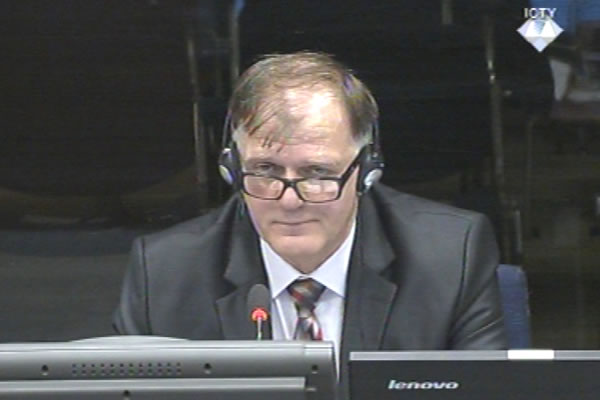Home
WITNESS CLAIMS HE DIDN’T KNOW HIS COLLEAGUE WAS KILLED IN A CAMP 22 YEARS AGO
Former official in the local Secretariat for National Defense Cedo Sipovac claimed that he didn’t know anything about the crimes against Muslims and Croats in the Prijedor municipality. Sipovac tried to convince the Trial Chamber that he had not known until today that his colleague Becir Medunjanin had been tortured and killed in Omarska in 1992 and that Medunjanin’s wife had been found dead after being taken out of the prison camp
 Cedo Sipovac, witness at the Radovan Karadzic trial
Cedo Sipovac, witness at the Radovan Karadzic trial This week, the testimonies of Radovan Karadzic’s defense witnesses from Prijedor have all been alike. They have all tried hard to corroborate the argument that Muslims were responsible for the conflicts in that municipality while Serbs seized power in the municipality only to defend themselves. All the witnesses denied that non-Serbs were forced to leave Prijedor; according to them, non-Serbs left of their own free will. For the most part, the witnesses didn’t say a word about the crimes, trying to present them as isolated incidents – contrary to the prosecution’s allegation that there was a widespread campaign of murders, detention, rapes and other crime aimed at instilling fear in the non-Serb population and making them leave the area.
The evidence of Cedo Sipovac, former employee of the Secretariat for National Defense in Prijedor, proceeded along a similar path. In his statement to Karadzic’s defense, Sipovac stated that Muslims prevented the call-up of JNA conscripts and that Muslim paramilitary groups attacked Prijedor on 30 May 1992, a month after the Serbs established power in the town. Sipovac was unaware that the role of the crisis staffs everywhere, and in Prijedor in particular, was to ‘set in motion the permanent elimination’ of Muslims and Croats from the territories Serbs claimed as theirs. Also, Sipovac maintained that he didn’t know there were prison camps in his home town. There were just two ‘investigation centers’, in Keraterm and Omarska and a ‘collection center’ in Trnopolje where non-Serbs civilians went voluntarily.
Prosecutor Lena Pelic reminded the witness in the cross-examination that immediately after the Serbs came into power in Prijedor on 30 April 1992, non-Serbs began to be laid off en masse, especially those in leadership positions. The witness denied the allegation, prompting the prosecutor to read out the names of a number of people who had been removed from their posts in his Secretariat and in related services. Among them were Becir Medunjanin and Vahid Ceric. The witness initially refused to admit that they were Muslims, claiming that it was ‘iffy’ to speak about the people’s ethnicity in their absence. Finally, Sipovac said that the civilian authorities in Prijedor were responsible for the layoffs, not the defense office where he worked.
Becir Medunjanin was a teacher from Kozarac. Just before the war Medunjanin was appointed chief of the Secretariat for National Defense where Sipovac worked. When Medunjanin was removed from this post, the prosecutor said, he was detained in the Omarska prison camp and was tortured and killed. The witness replied he had never, in the 22 years that followed, heard about Medunjanin being killed in Omarska. Also, Sipovac said that he had never heard about Medunjanin’s wife Sadeta, who was taken out of the same prison camp and was later found dead in a mass grave. ‘I don’t know, believe me, I really don’t know, I am sorry if that is true, but I hear this now for the first time’, Sipovac said.
As the cross-examination continued, the prosecutor showed the witness some military documents that speak about the crimes against non-Serbs from Prijedor. The prosecutor also showed parts of the testimony of Slobodan Avlijas, the Bosnian Serb deputy justice minister. Avlijas said in his evidence that the ‘entire Republika Srpska knew’ about the murder of the inhabitants of Prijedor at Koricanske Stijene. Also, the prosecutor referred to the evidence of Milomir Stakic, president of the Prijedor Crisis Staff. In his evidence in Karadzic’s defense Stakic admitted that the ‘crimes were committed and people were expelled’. Sipovac stuck to his claim that he didn’t know anything about those events, except maybe about the Koricanske Stijene massacre.
Linked Reports
- Case : Karadzic
- 2014-01-21 KARADZIC’S WITNESSES TOOK ACTIVE PART IN PRIJEDOR EVENTS
- 2014-01-21 INVESTIGATOR AND PRIJEDOR ‘GRAPEVINE’
- 2014-01-20 KVOCKA DENIES CRIMES IN OMARSKA
- 2014-01-23 WITNESS: I BEGGED THEM ‘AS BROTHERS’ TO LAY DOWN ARMS
- 2014-01-27 KARADZIC’S WITNESS: FOREIGN SERVICES BEHIND THE KORICANSKE STIJENE MASSACRE
- 2014-01-28 MLADIC DESERTS KARADZIC’S FRONT LINE
